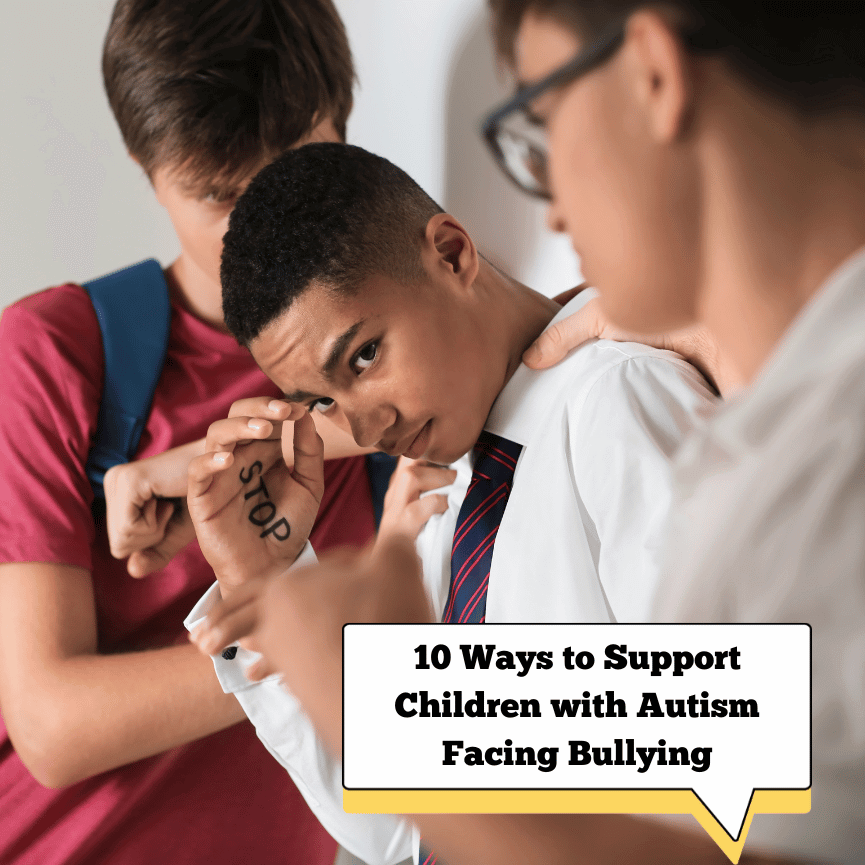
- Nov 13, 2024
- 21 Views
- 0 Comments
10 Ways To Support Children With Autism Facing Bullying
Supporting Children with Autism Who Face Bullying: Top 10 Tips for Parents and Educators
Bullying is a distressing experience for any child, but for children with autism, it presents unique challenges. These children often face social misunderstandings and sensory sensitivities and may have different ways of communicating. As a result, they can be more vulnerable to bullying, which may include verbal taunts, social exclusion, or even physical intimidation. With the right support from parents and educators, autistic children can learn to handle these situations, feel protected, and develop resilience.
In this article, we'll cover 10 actionable ways that parents and educators can support autistic children who experience bullying. With a proactive approach, we can help autistic children navigate these experiences, build social confidence, and reduce the impact bullying can have on their mental well-being.
Understanding Bullying and Autism
What is Bullying?
Bullying is the act of repeatedly harming, intimidating, or humiliating someone. It may include physical harm, verbal insults, cyberbullying, or social exclusion. For autistic children, bullying is particularly damaging because they may struggle to interpret social cues or respond in ways that might discourage the bully. Moreover, they may find it harder to explain what’s happening to them or to seek help.
Why Are Autistic Children Vulnerable to Bullying?
Autistic children can be more vulnerable to bullying for several reasons:
- Difficulty with Social Cues: Autistic children may struggle to read social cues, like facial expressions or tone of voice, making it harder to tell if someone is being friendly or mean.
- Unique Behaviors and Interests: Autistic children may have specific interests or repetitive behaviors that others might not understand, potentially leading to teasing.
- Limited Social Networks: They may have fewer friends or social allies, leaving them more isolated and less likely to have someone to turn to if they are bullied.
Recognizing Signs of Bullying in Autistic Children
Autistic children might not verbalize that they are being bullied, so recognizing signs is essential. Signs to look out for include:
- Sudden changes in mood or behavior
- Increased anxiety or reluctance to go to school
- Physical symptoms, like headaches or stomachaches
- Decreased academic performance
- Withdrawal from social situations they previously enjoyed
By being vigilant, parents and educators can spot these signs and take action to prevent further harm.
10 Ways to Support Autistic Children Experiencing Bullying
1. Encourage Open Communication
Open, honest communication is key to supporting any child, especially those who are autistic. Create a safe environment where your child feels comfortable discussing their school day, friendships, and any worries they might have. Asking open-ended questions—such as “How was your day?” or “Did anything bother you today?”—can help them share their experiences.
2. Teach Self-Advocacy Skills
Self-advocacy is an empowering skill, enabling children to express their needs and boundaries. For autistic children, who may have difficulty articulating their feelings, teaching self-advocacy can be life-changing. Help them practice short, clear sentences like, “Please don’t do that,” or “I need help.” Simple role-playing at home or in therapy can make this easier.
3. Foster a Safe Environment at School
Collaborate with school staff to ensure there’s a designated safe space at school for your child to retreat to if they feel overwhelmed or unsafe. This could be the counselor’s office, a sensory room, or a quiet corner in the library. Having a designated “safe place” helps the child feel secure and know there’s a place where they can regain their sense of calm.
4. Work with Teachers and School Staff
Teachers and school staff should be aware of the unique challenges autistic children face. Developing a comprehensive plan with the school’s assistance can make a big difference. This could include:
- Regular check-ins with the child to monitor their experience
- Encouraging staff to intervene if they notice bullying
- Making all staff aware of where the child can go if they feel unsafe
5. Educate Peers About Autism
Educating classmates about autism can create an environment of understanding and inclusion. When peers understand that some children may communicate or behave differently, they are more likely to react with empathy. Schools can use age-appropriate materials to foster this understanding.
6. Create Personalized Coping Strategies
Some children find comfort in coping mechanisms that cater to their specific needs. Personalized strategies, such as deep breathing, using sensory tools (like fidget toys), or having visual schedules, can help autistic children self-regulate when they’re feeling stressed or anxious.
7. Encourage Positive Friendships
Encouraging positive friendships helps autistic children feel valued and supported. Whether through school clubs, after-school activities, or social groups, involving them in shared-interest activities can foster strong friendships, which can serve as a protective factor against bullying.
8. Empower with Social Skills Training
Social skills training can help autistic children better navigate complex social situations. By practicing scenarios like eye contact, tone of voice, and recognizing sarcasm or humor, they become more confident in interpreting social cues. Social skills classes, often available through school programs or local support groups, are a great resource.
9. Use Role-Playing to Prepare for Real-Life Situations
Role-playing can be an effective tool to help autistic children prepare for real-world challenges, including bullying. Practicing scenarios like standing up to a bully, asking for help, or walking away from a tense situation can build confidence and reduce anxiety when these situations occur.
10. Build Resilience and Emotional Strength
Building resilience helps children handle setbacks and maintain a positive outlook. Encourage them to focus on their strengths, celebrate small victories, and practice positive self-talk. By reinforcing their self-worth and helping them recognize their unique strengths, parents and educators can help build emotional resilience, which will benefit them in all areas of life.
Supporting autistic children who experience bullying requires a proactive, compassionate approach. By working together, parents and educators can provide these children with a safe, respectful, and empowering environment. From encouraging open communication to building resilience, there are many ways to make a lasting difference. Through awareness, education, and active support, we can help autistic children feel secure and confident in facing social challenges.


Comments - 0 comments till now